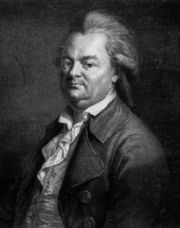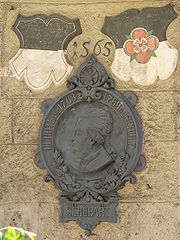
Christian Friedrich Daniel Schubart
Encyclopedia

Poet
A poet is a person who writes poetry. A poet's work can be literal, meaning that his work is derived from a specific event, or metaphorical, meaning that his work can take on many meanings and forms. Poets have existed since antiquity, in nearly all languages, and have produced works that vary...
, born at Obersontheim
Obersontheim
Obersontheim is a town in the district of Schwäbisch Hall in Baden-Württemberg in Germany....
in Swabia
Swabia
Swabia is a cultural, historic and linguistic region in southwestern Germany.-Geography:Like many cultural regions of Europe, Swabia's borders are not clearly defined...
.
He entered the university of Erlangen in 1758 as a student of theology
Theology
Theology is the systematic and rational study of religion and its influences and of the nature of religious truths, or the learned profession acquired by completing specialized training in religious studies, usually at a university or school of divinity or seminary.-Definition:Augustine of Hippo...
. He led a dissolute life, and after two years' stay was summoned home by his parents. After attempting to earn a livelihood as private tutor and as assistant preacher, his musical talents gained him the appointment of organist in Geislingen an der Steige
Geislingen an der Steige
Geislingen an der Steige is a town in the district of Göppingen in Baden-Württemberg in southern Germany.-History:Although the area had settlements since the Bronze Age, Geislingen was founded by the counts of Helfenstein as a transit collection station on the important commercial route between the...
, and subsequently in Ludwigsburg
Ludwigsburg
Ludwigsburg is a city in Baden-Württemberg, Germany, about north of Stuttgart city centre, near the river Neckar. It is the largest and primary city of the Ludwigsburg urban district with about 87,000 inhabitants...
; but as a consequence of his wild life and blasphemy
Blasphemy
Blasphemy is irreverence towards religious or holy persons or things. Some countries have laws to punish blasphemy, while others have laws to give recourse to those who are offended by blasphemy...
, found expressed in a parody of the litany
Litany
A litany, in Christian worship and some forms of Jewish worship, is a form of prayer used in services and processions, and consisting of a number of petitions...
, he was expelled from the country.

Heilbronn
Heilbronn is a city in northern Baden-Württemberg, Germany. It is completely surrounded by Heilbronn County and with approximately 123.000 residents, it is the sixth-largest city in the state....
, Mannheim
Mannheim
Mannheim is a city in southwestern Germany. With about 315,000 inhabitants, Mannheim is the second-largest city in the Bundesland of Baden-Württemberg, following the capital city of Stuttgart....
, Munich and Augsburg
Augsburg
Augsburg is a city in the south-west of Bavaria, Germany. It is a university town and home of the Regierungsbezirk Schwaben and the Bezirk Schwaben. Augsburg is an urban district and home to the institutions of the Landkreis Augsburg. It is, as of 2008, the third-largest city in Bavaria with a...
. In Augsburg, he made a considerable stay, began his (German Chronicle, 1774–1778) and eked out a subsistence by reciting from the latest works of prominent poets. Owing to a bitter attack upon the Jesuits
Society of Jesus
The Society of Jesus is a Catholic male religious order that follows the teachings of the Catholic Church. The members are called Jesuits, and are also known colloquially as "God's Army" and as "The Company," these being references to founder Ignatius of Loyola's military background and a...
, he was expelled from Augsburg and fled to Ulm
Ulm
Ulm is a city in the federal German state of Baden-Württemberg, situated on the River Danube. The city, whose population is estimated at 120,000 , forms an urban district of its own and is the administrative seat of the Alb-Donau district. Ulm, founded around 850, is rich in history and...
, where he was arrested in 1777 and confined in the fortress of Hohenasperg
Hohenasperg
Hohenasperg, located in the federal state of Baden-Württemberg near Stuttgart, Germany, of which it is administratively part, is an ancient fortress and prison overlooking the town of Asperg. It was an active fortification between 1535 and 1593.-Geography:...
.
Here he met with lenient treatment, and he spent the time by a study of mystical works and in composing poetry. His (Complete Poems) appeared in two volumes at Stuttgart in 1785/1786 (new edition by Gustav Hauff, Leipzig, 1884, in Reclam
Reclam
thumb|A 1902 catalogReclam Verlag or just Reclam is a German publishing house, established in Leipzig in 1828 by Anton Philipp Reclam. It is known for its "little yellow books", in particular those of its "universal library" ....
s Universal-Bibliothek); in this collection most of the pieces are characterized by the "Sturm und Drang
Sturm und Drang
Sturm und Drang is a proto-Romantic movement in German literature and music taking place from the late 1760s through the early 1780s, in which individual subjectivity and, in particular, extremes of emotion were given free expression in reaction to the perceived constraints of rationalism...
" period.
He was set free in 1787 by Frederick the Great, king of Prussia, and expressed his gratitude in "" ("Hymn to Frederick the Great"). Schubart was now appointed musical director and manager of the theatre at Stuttgart, where he continued his and began his autobiography, ("Schubart's Life and Thoughts", 2 vols, 1791–1793), but he died before its completion in Stuttgart. His (Collected Writings and Fates) appeared in 8 volumes (Stuttgart, 1839–1840).
External links
- Ideen zu einer Aesthetik der Tonkunst (Vienna, 1806; excerpts) — was a resource for Robert SchumannRobert SchumannRobert Schumann, sometimes known as Robert Alexander Schumann, was a German composer, aesthete and influential music critic. He is regarded as one of the greatest and most representative composers of the Romantic era....
, as music critic, and also for Johannes BrahmsJohannes BrahmsJohannes Brahms was a German composer and pianist, and one of the leading musicians of the Romantic period. Born in Hamburg, Brahms spent much of his professional life in Vienna, Austria, where he was a leader of the musical scene...
. - Schubart Museum in Aalen (Exhibit on his life and work)
- Der Bettelsoldat (mp3) — Free audio book.
- The organ und church where Schubart worked as a young man
- Information from the Schubart Quintet

